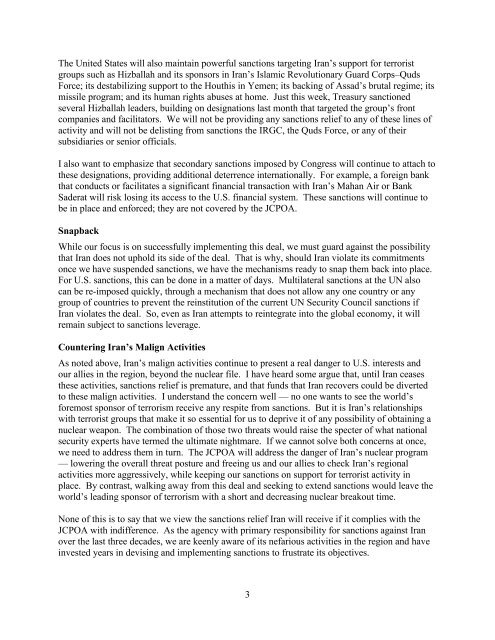WHAT YOU NEED TO KNOW ABOUT THE JCPOA
jcpoa_what_you_need_to_know
jcpoa_what_you_need_to_know
- No tags were found...
You also want an ePaper? Increase the reach of your titles
YUMPU automatically turns print PDFs into web optimized ePapers that Google loves.
The United States will also maintain powerful sanctions targeting Iran’s support for terroristgroups such as Hizballah and its sponsors in Iran’s Islamic Revolutionary Guard Corps–QudsForce; its destabilizing support to the Houthis in Yemen; its backing of Assad’s brutal regime; itsmissile program; and its human rights abuses at home. Just this week, Treasury sanctionedseveral Hizballah leaders, building on designations last month that targeted the group’s frontcompanies and facilitators. We will not be providing any sanctions relief to any of these lines ofactivity and will not be delisting from sanctions the IRGC, the Quds Force, or any of theirsubsidiaries or senior officials.I also want to emphasize that secondary sanctions imposed by Congress will continue to attach tothese designations, providing additional deterrence internationally. For example, a foreign bankthat conducts or facilitates a significant financial transaction with Iran’s Mahan Air or BankSaderat will risk losing its access to the U.S. financial system. These sanctions will continue tobe in place and enforced; they are not covered by the <strong>JCPOA</strong>.SnapbackWhile our focus is on successfully implementing this deal, we must guard against the possibilitythat Iran does not uphold its side of the deal. That is why, should Iran violate its commitmentsonce we have suspended sanctions, we have the mechanisms ready to snap them back into place.For U.S. sanctions, this can be done in a matter of days. Multilateral sanctions at the UN alsocan be re-imposed quickly, through a mechanism that does not allow any one country or anygroup of countries to prevent the reinstitution of the current UN Security Council sanctions ifIran violates the deal. So, even as Iran attempts to reintegrate into the global economy, it willremain subject to sanctions leverage.Countering Iran’s Malign ActivitiesAs noted above, Iran’s malign activities continue to present a real danger to U.S. interests andour allies in the region, beyond the nuclear file. I have heard some argue that, until Iran ceasesthese activities, sanctions relief is premature, and that funds that Iran recovers could be divertedto these malign activities. I understand the concern well — no one wants to see the world’sforemost sponsor of terrorism receive any respite from sanctions. But it is Iran’s relationshipswith terrorist groups that make it so essential for us to deprive it of any possibility of obtaining anuclear weapon. The combination of those two threats would raise the specter of what nationalsecurity experts have termed the ultimate nightmare. If we cannot solve both concerns at once,we need to address them in turn. The <strong>JCPOA</strong> will address the danger of Iran’s nuclear program— lowering the overall threat posture and freeing us and our allies to check Iran’s regionalactivities more aggressively, while keeping our sanctions on support for terrorist activity inplace. By contrast, walking away from this deal and seeking to extend sanctions would leave theworld’s leading sponsor of terrorism with a short and decreasing nuclear breakout time.None of this is to say that we view the sanctions relief Iran will receive if it complies with the<strong>JCPOA</strong> with indifference. As the agency with primary responsibility for sanctions against Iranover the last three decades, we are keenly aware of its nefarious activities in the region and haveinvested years in devising and implementing sanctions to frustrate its objectives.3


